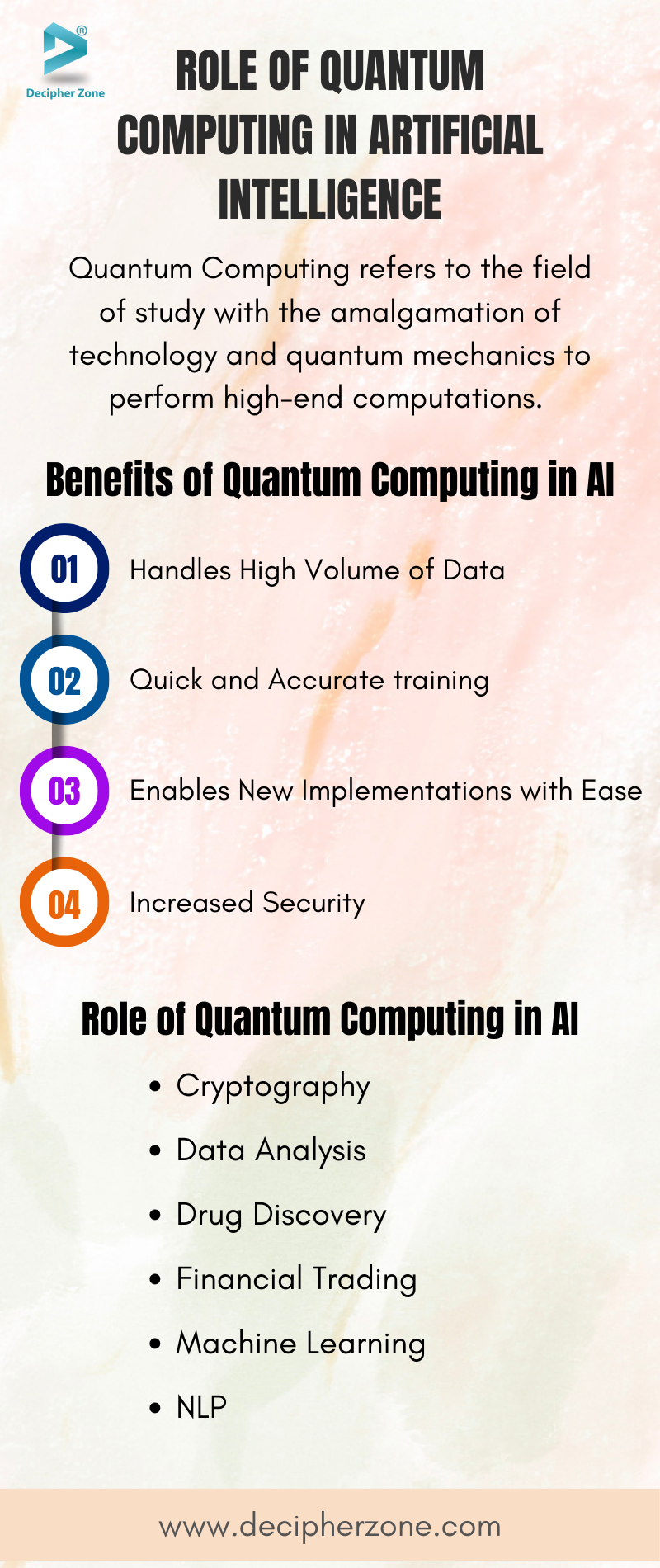Role of Quantum Computing in Artificial Intelligence (AI). Science is an extensive spectrum of illusions and inventions. With numerous applications and fields of science, one crucial part is Physics, whose laws have not only brought new theories to life but have also simplified the lives of people and businesses with its integration with technology.
Be it Metcalfe’s law that holds true in every network or Fitt's Law to graphical user interface and user experience, physics has come a long way, not just in academics but also in the IT industry.
And one such law is Quantum theory which has brought the term ‘Quantum Computing’ to life.
With this blog, we aim to provide you with an overview of Quantum computing, along with its capabilities and its role in AI.
Quantum Computing in Artificial Intelligence
Quantum Computing works by the principles of Quantum mechanics that help with solutions that are quick, secure, and precise as compared to traditional technologies.
It refers to the field of study with the amalgamation of technology and quantum mechanics to perform high-end computations. It comprises the design, development, and application of quantum hardware, along with the formulation and implementation of quantum algorithms.
Read: Advantages and Disadvantages of Artificial Intelligence
Furthermore, one aspect of quantum computing is quantum programming which focuses on the software aspect and involves designing and applying algorithms and programs with languages like Qiskit, Cirq, and others.
Benefits of Quantum Computing in AI
Quantum computing has innumerable benefits and some of them are as follows -
1. Handles High Volume of Data
2. Quick and Accurate training
3. Enables New Implementations with Ease
4. Increased Security
Handles High Volume of Data - The primary benefit of Quantum computing in Artificial Intelligence is that it helps in handling high-volume data.
Quick and Accurate training - Quantum Computing helps in training the AI models in a faster and more precise manner as compared to traditional computing methods, which in turn also makes the models to be more reliable.
Enables New Implementations with Ease - It also enables new implementations into the AI models to improve the business as well as the services, which in turn optimizes and enhances operational efficiency and workflow.
Increased Security - Quantum computers also aid in the development of new security paradigms and encryption algorithms which helps in protecting digital information like any sensitive data, customer bank details, and others safe from cyberattacks and hackers.

Role of Quantum Computing in AI
Now that you know about the benefits of Quantum Computing in Artificial Intelligence, below are some of the ways where quantum computing in AI can be beneficial.
1. Cryptography
3. Drug Discovery
4. Financial Trading
5. Machine Learning
6. NLP
Read: Artificial Intelligence in Software Testing
Cryptography - It can help in developing new encryption algorithms that are highly secured and unbreakable by traditional computers, thus keeping sensitive data safe along with secure communication in AI systems.
Data Analysis - It can help in analyzing large amounts of datasets efficiently and quickly and also helps in providing accurate results, which in turn enhances decision-making capabilities alongside efficient pattern recognition.
Drug Discovery - Quantum computers are more than just hardware and software. It can also be used to understand and replicate the behavior of molecules, which in turn helps in material science and quantum chemistry, and also helps in devising new drugs and medicines quickly and effectively.
Financial Trading - As we already know, Quantum computers are capable of handling large datasets, they can help in analyzing large amounts of financial data, which helps traders and financial brokers to enhance their decision-making process alongside catering to their growth and minimizing the risks associated with it.
Machine Learning - Quantum computing is capable of doing several things along with easing the complexities of those tasks, and one such thing is machine learning. It can help in accelerating the machine learning tasks like training deep neural networks as well as faster and improved performance. Furthermore, it can also be used for optimization tasks, providing accurate predictions, discovering hidden patterns, and many more.
NLP - It can also help in enhancing the natural language processing tasks by enabling quicker and more precise analysis like sentiment analysis, translation, and others. As it is capable of handling complexity, it helps in improved understanding of language and opens up ways for new language generation capabilities.
Wrapping It Up
Quantum computing is a broader field and since it is in its initial phase, it has way more opportunities to grow, as large-scale quantum computers are not available extensively and are still under development.
However, Quantum Computing in Artificial Intelligence has the potential to significantly impact the growth and development of AI along with unlocking new levels of capabilities.
But there is ongoing research where the true potential of Quantum computing is yet to be discovered to pave the way for revolutionizing artificial intelligence.
FAQs
What are some of the industries where Quantum Computing can be beneficial?
Some of the industries where Quantum computing is beneficial are -
-
Aerospace and Defense
-
Energy and Utilities
-
Environmental Sciences
-
Finance and Banking
-
Healthcare and Pharmaceuticals
-
Manufacturing and Supply Chain
-
Telecommunications, and many others.
What are the challenges of integrating Quantum computing with AI?
There are several pitfalls of integrating Quantum computing with Artificial Intelligence, and they are as follows -
-
Data Representation
-
Hardware Limitations
-
Integration with Traditional/Classical Computing
-
Scalability, and many others.
What are the different Quantum programming languages?
The different Quantum Programming languages are -
-
Ket
-
QFC and QPL
-
QML
-
Scaffold
-
Quantum pseudocode
-
Silq, and others.

